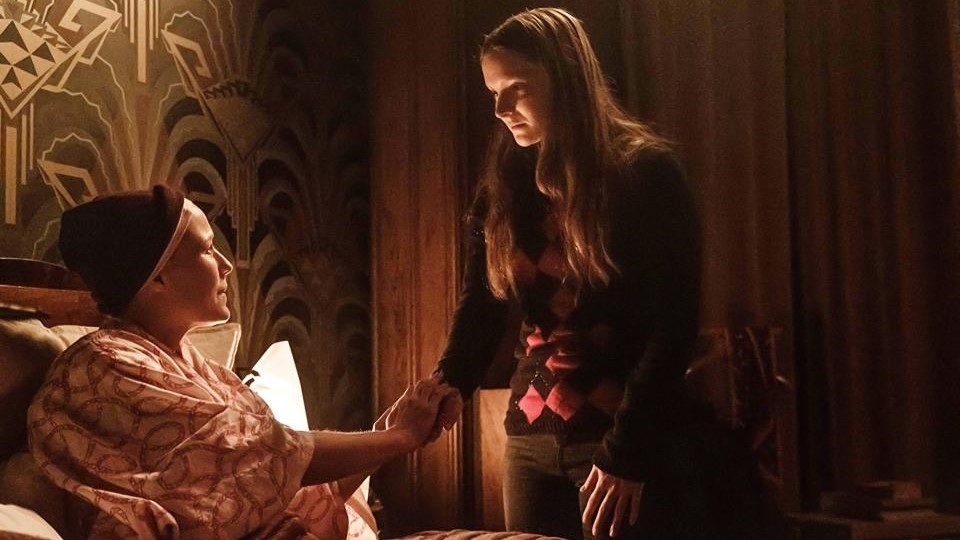Saint Maud
2019

Rated: R
Genre: Thriller, Drama, Horror
Country: U.K.
Run-Time: 1h 24min
Director: Rose Glass
Cast
Morfydd Clark……………..Maud
Jennifer Ehle………………..Amanda
Lily Frazer……………………….Carol
Lily Knight……………………..Joy
My wife grew up in a church-going family. She tells me that when she was a young girl, the story of Our Lady of Fátima terrified her. For those who don’t know, Our Lady of Fátima is the name of a famous Marian apparition- or visit by the Mother Mary- that occurred in 1917. The belief is that Mary visited three shepherd children living in Fátima, Portugal on six separate occasions. During one of these visits, Mary had asked the children to devote themselves to the Holy Trinity and to pray the Rosary every day to bring an end to the first World War. During another, she asked them to report on a coming miracle which many believe was the Miracle of the Sun, an event in which multiple witnesses claim to have seen the sun move erratically in the sky before emitting a series of rainbow of colours. On another occasion, Mary told the children three prophecies, the most famous being about the attempt on Pope John Paul II’s life in 1981. The children claim she had also showed them a vision of Hell, and told them of their deaths, which seemed particularly cruel since two of the children died in only a few years after of the Spanish flu. The third child lived to be 97; however, she became a nun and due to her fame and peculiar history, she was encouraged to interact with as few people as possible during the course of her lifetime.
The church uses this story as an example of faith, selflessness, and devotion, but my wife at a young age could not help but recognize that no good seemed to come to the children after those visits from Mary…at least not during their time on Earth. In fact, one could easily argue that the Marian apparition ruined the remainder of their lives. Thus, my wife’s biggest fear growing up was that she too would someday be “chosen” to get a visit from Mary. After all, who in their right mind would want peak into Hell, be burdened by prophies about horrific historical events, or learn about their own death?
My point for telling this story is simple. At times, religion can be scary. That is why horror emersed with religious imagery is so effective, particularly for those who attended church regularly at any point in their lives. The release of The Exorcist in 1973 only helped to confirm this fact, though battles for the soul against the devils and demons have easily become an overused trope in the modern era. (Just think of how many films are called The Possession of [Insert female name here].)
But Saint Maud is different. It shows us a different path to making religion terrifying: one that sits a little closer to my wife’s childhood fears.
Saint Maud is the first feature film by British director Rose Glass. In it, a young hospice nurse named Maud (Morfydd Clark) takes on a job at the home of Amanda (Jennifer Ehie), a 49-year-old celebrity dancer turned choreographer who is terminally ill with lymphoma. At first, Maud comes across as a judgemental, loner, eccentric who often begs God in her prayers to show her the right path. But Amanda, who unlike Maud is a very sensual, unrestrained person, finds her new nurse to be increasingly intriguing, especially after Maud admits that she actually “feels God’s presence” and makes strangely erotic motions in Amanda’s presence as though she is being caressed by an invisible hand. Amanda, repeating Maud’s motions as if learning new choreography, claims she can feel it too, which puts the idea into Maud’s head that she might be having a positive effect on the unrepented artist. Maud then decides on her own that it is her mission is to save Amanda’s soul and, naturally, things get worse from there.
Glass seems to use saint Maud to channel her inner Ari Aster. Like Hereditary or Midsommar, Saint Maud is steeped in symbols and subtle sound bites that are easy to miss on first viewing, but provide added detail for the incredibly observant. Maud’s point of view is particularly fascinating because it is not at all reliable. But the film’s symbolism points us in the direction of a truth, and helps us to better appreciate how Maud, being a woman who is continuously hunting for signs of God’s greater plan, interprets what she sees.
With Saint Maud, Glass proves to be a remarkably patience and confident storyteller. The film opens with drips blood from a woman on a stretcher. Maud, in scrubs, sits in the corner of a room starring at a bug on the ceiling, blood on her hands. The tone is set for a horror film, but then the next hour would play out like a typical drama if it were not for those moments where Maud bursts into spontaneous extasy. (If she really does feel God, he seems to know where to touch her.) The film is propelled forward by the strength of its unique dynamic between Maud and Amanda, which can be largely credited to the brilliant performances of Clark and Ehie. They are perfectly cast. But the audience knows that the pairing of a self-centered artistic atheist with an uptight religious zealot is clearly a relationship that is doomed from the onset, as both will, in their own ways, overstep the others’ boundary.
But then, in the last half hour of the film, Glass makes good on that early promise and Saint Maud finally proves that it truly is horror. The film’s relative calm beginning make the scares that do come jarring and much more effective. But the most talked about scene in discussions about this movie will likely always center around that final image that flickers on the screen before the credits start to roll.
In many ways, Saint Maud has a lot in common with other psychological thrillers. There are flashes of films such as Black Swan, Repulsion, or May in the way the story unfolds. But Saint Maud stands out from the pack because its use of religion and the subtle hints about Maud’s past provide the film with a wealth of subtext and have made it more open to interpretation, though personally, I prefer the psychological one. The meticulously crafted details show Glass’s potential as a significant voice if she continues to pursue horror as her genre of choice.
Regardless, the lesson I walked away with after seeing Saint Maud made me think of my wife’s fear: whether it be real or imagined, there just does not seem to be a lot of benefit to being picked as one of God’s chosen. At least not while you are breathing.
